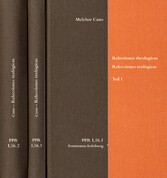Suchen und Finden
Service

Relectiones theologicae. Relecciones teológicas
von: Melchor Cano, Thomas Duve, Alexander Fidora, Heinz-Gerhard Justenhoven, Matthias Lutz-Bachmann, Andreas Niederberger
Reihe: Politische Philosophie und Rechtstheorie des Mittelalters und der Neuzeit., Band: Abteilung I: Texte. - PPR I,16,1-2
frommann-holzboog Verlag e.K. , 2023
ISBN: 9783772836466 , 658 Seiten
Format: PDF
Kopierschutz: Wasserzeichen


Preis: 396,00 EUR
Der vorliegende Band bietet eine kritische Edition der >Relectiones theologicae< des Melchior Cano, ein herausragender Vertreter der Schule von Salamanca. In den 1547/48 öffentlich vorgetragenen >Relectiones< stellte Cano seine Ansichten über die Sakramente und die Buße dar, die für die Geschichte des Normativitätsdenkens von großer Bedeutung sind und die zu den brisantesten Fragen des Konzils von Trient gehörten. Der 1550 veröffentlichte Text dokumentiert die Auseinandersetzung des Autors mit den Konzilsdekreten. 1551 entsandte Karl V. ihn als Theologe des kaiserlichen Hofes zum Konzil. Belda Plans ergänzt das lateinische Original durch eine zweite Quelle (>editio Ingolstadt< 1580) und übersetzt es ins Spanische. Eine theologische und eine rechtshistorische Studie leiten den edierten Text ein. One of the major exponents of the School of Salamanca and a foundational figure of early modern moral theology was Melchior Cano. He held two solemn readings (>relectiones<) on the sacraments in general and on penance in particular that are of great importance for the history of normative thinking. In the edition of the >relectiones< complied by Belda Plans the text incorporates significant variations of the edition of Ingolstadt of 1580. Moreover, the editor has provided the first translation of the text into contemporary Spanish, a preliminary essay and a general introduction. This work is an original historiographical contribution, which addresses a significant gap in the research and represents an indispensable work for historians of humanistic areas of study (law, philosophy, theology).
Alle Preise verstehen sich inklusive der gesetzlichen MwSt.



